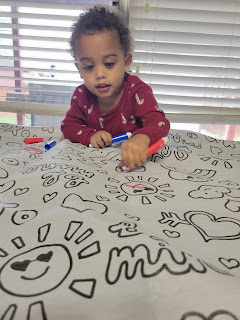How to Prepare your Child for Kindergarten
What Your Child Should Know and How to Prepare
Preparation
Children will thrive in an environment that sparks their curiosity, builds their self-confidence, and creates a love of learning. When I plan learning activities the idea is not to push learning on the child but to encourage them to love learning. I believe that it starts at home. Reading books, using writing tools, and simply talking to your child about what they are thinking while they are exploring are some effective ways to create a strong foundation. It is important to know what you should focus on to prepare. The primary domains of development are:
Physical- Gross and fine motor
Mathematical - Concepts and thinking
Literacy - Reading and writing
Health
Language and communication
By kindergarten, children should be able to sequence, sort, and use problem-solving skills. Including knowing how to count to 20 and what those numbers look like. Children should be familiar with the alphabet and the sound of each letter. Lastly, they should know how to read and write short words including their name.
With that, preparing for kindergarten extends beyond books and often parents forget the other half of school readiness. Children should know how to share and work cooperatively with others. In addition, paying attention and being able to follow simple step instructions. They should comprehend a daily routine and be in a position to follow it. Such as preparing your child to eat their lunch within a certain time period and understanding how to open their food. Be able to use technology such as iPads. Be able to explore and work on coordination. For example, how to use scissors or tie their shoes. Be confident to ask questions and seek answers. Lastly, shows awareness of themself and their abilities, understand basic feelings, and are able to communicate their needs or wants.
What Your Child Should Know Academically by 6
- Know rhyming words and use them.
- Knows how to make predictions and make personal connections with a read-aloud book.
- Produces and knows the letter and sound of the first letter in their name and practices writing their name.
- They can produce sentences correctly.
- Can participate in onset blending activities.
- Sing the alphabet song and be aware of the letters.
- Understands how to text directionality.
- Can observe and point out repeated words in books.
- Explores many drawing tools and attempts to write.
- Can contribute ideas in a small group or a whole group during writing lessons- revise/drafts.
- Shares written story.
- Can count to 1-20 or 1-30
- Can count at least 5 objects.
- Understands more, less, equal to
- Comprehends taking away one or more objects will decrease the amount.
- Knows 2D shapes and is learning 3D shapes.
- Attempts to draw shapes and use language to describe it.
- Can compare objects and shapes.
- Observes length, weight, and capacity of an object can vary and be compared.
- Understands the passage of time in a day.
- Can sort objects that are the same and different.
- Collects data and organizes with a group.
- Recognizes patterns
- Observes, investigates, describes, and discusses the position and motion of objects.
- Uses simple scientific tools.
- Discusses sources of energy including light, heat, and electricity.
- Observes, investigates, describes, and discusses the characteristics of organisms and life cycles.
- Discusses the relationship of organisms in their environments.
- Discusses objects in the sky and earth materials, and their properties and uses.
- Importance of caring for our environment and our planet
- Identifies similarities and differences between himself, classmates, and other people through specific characteristics and cultural influences.
- Characteristics of families
- Connects his life to events, time, and routines.
- Understanding that all people need food, clothing, and shelter.
- What it means to be a consumer
- Responsibilities of family, school, and community helpers.
- Explore geographic tools.
- Understands the flag representation.
- Voting and decision making
- Uses art and dramatic play.
I know this is a long list and don't stress if your child has not learned everything by kindergarten. It is all taught in kindergarten as well. I listed these guidelines if you want your kid to have a head start in school. Do not feel overwhelmed or behind. Most learning is accomplished by your child exploring the world around them. Follow me for more learning tips and activities to inspire your child to learn. As part of this blog, I will focus on expectations and how to prepare. I will help guide you and your child to activities that cover this content. Keep reading and have fun learning!!





Comments
Post a Comment